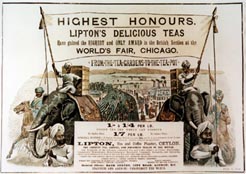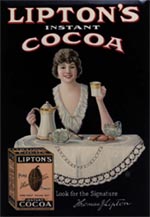Life Story of Sir Thomas Lipton
Growing the Business

Throughout the 1890s Lipton continued to prosper. His close relationship with America and his frequent visits there led him to the decision to break into the American tea market: "I had ample margins of supplies for prospective American customers provided I could prevail upon them to become addicted to my tea in the same way as I had come to be a firm believer in their hams, bacons and cheese". (Lipton, p181)

His businesses rapidly expanded not only in tea plantations but also in coffee and cocoa estates, fruit farms in Kent, Chicago packing companies and meat stores, bakeries, curing stations and wine stores.
As long as his parents were alive he had resisted the logical move to London. However, as more and more decisions were taken south of the border, he spent half his life on trains going back and forth. In 1889 his mother died. He had lost his "best friend and trustiest consellor". (Lipton, p196) His father died a few months later. Without his parents to tie him to Glasgow he took the decision to move to London and soon opened new offices in Bath Street, City Road in London.
In 1898 Lipton "yielded to the public clamour" ( Crampsey, p71) and allowed his empire to become a limited company. The professional view of the company was that while it was rock solid it was no longer capable of drastic expansion. Slow and steady growth would lead to long term investment but no quick wins. What the professionals didn't take into account was the high regard and affection the public had for the Lipton brand. There was an unprecedented rush for shares. At the National Bank of Scotland the police had to regulate the crowds. Applications were received for almost £50m worth of shares. On the 2nd of June that year, Lipton directed his first shareholders' meeting. It was also the first time in thirty years, since the opening of his first shop in Glasgow, that he had to answer to anyone but himself.
As a public company, Lipton's continued to prosper increasing turnover and dividends year after year. However, the situation rapidly changed in the 1920s when large companies such as Home and Colonial Stores and Van den Berghs (later part of Unilever) were the main competition. In 1927 Van den Berghs acquired 25% of the shares and Sir Thomas retired from active control of the company. Sir John Ferguson took over as chairman retaining Lipton as life president. However it was a title with no power and within two months Sir Thomas had sold his interests in the company to the Meadow Dairy Company (controlled by Home and Colonial). He was reputed to have been paid £1,000,000. He did not however, relinquish control of his American company, Thomas J. Lipton Inc. or his tea interests in Ceylon.
